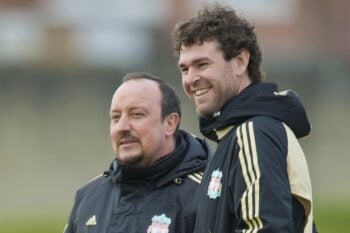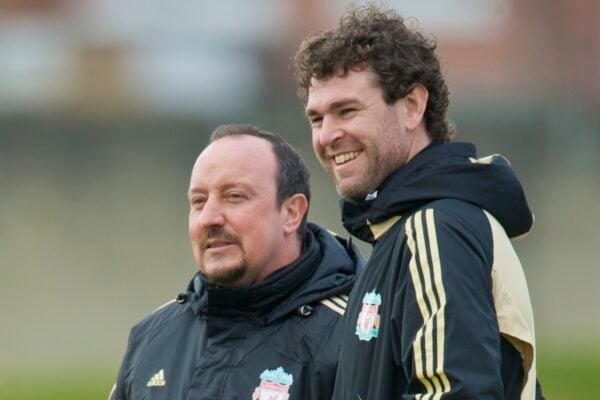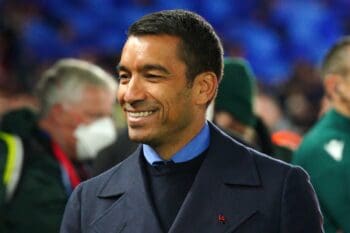Keith Perkins continues the impressive Forgotten Heroes series with a look at one of Bill Shankly‘s signings whose career at Anfield started brightly but somewhat faded out.
Alun Evans: Midas in Reverse
In September of 1968, Liverpool signed a 19-year old blond-haired golden boy from Wolves for the outrageous sum of £100,000. He was brought in as a long-term replacement for Tony Hately, who himself had shocked the League a year earlier with an almost equally expensive transfer from Chelsea. The difference was that Tony Hately was an established player, possibly at his peak of performance when he arrived at Anfield. Alun Evans had two years with Wolves as a teenaged prodigy before joining Liverpool, during which time he showed plenty of potential for the future.
Bill Shankly‘s attention was drawn to this precocious young player when Liverpool hosted Wolves in 1967. In this particular match, Evans had the gall to make Ron Yeats look average by using his quick turns, sudden changes of direction, and flicks and tricks, and even managing to score against the mighty reds. When Shankly found out that he was later available for transfer, he made sure that there was only one place that this promising youngster was going to end up ‘“ Anfield.
Evans made his Liverpool debut at Anfield and scored after only ten minutes against Leicester in a 4-0 win on September 21st, 1968. At the same time, plenty of teenage girls were squealing with delight looking at pictures of this golden haired teenager who had suddenly been thrust into the limelight. Even girls who were Manchester United supporters – because of their infatuation with George Best – were swooning over the gorgeous young Alun. Coincidentally (I’m sure), this was also the time when my older sister’s interest in football, and Liverpool FC in particular, was aroused.
It was inevitable that Wolves would play Liverpool at some point, but nobody could have predicted what would happen. It was only a week after Evans’s debut at Anfield that he returned to Molineux on September 28th, 1968 to face his old club. It was not a good day for Wolves as Liverpool won 6-0 with Evans scoring twice.
 That should have been the beginning of a glorious future for Alun Evans; but that’s not the way the script was written for him. Instead, that first season at Anfield was his best ever, even though he could only score a disappointing seven goals in all. The following season, things went from bad to worse with first a string of injuries causing him to be sidelined for much of the season, and then an attack with a broken glass to the face in a nightclub in Wolverhampton left him scarred both physically and emotionally.
That should have been the beginning of a glorious future for Alun Evans; but that’s not the way the script was written for him. Instead, that first season at Anfield was his best ever, even though he could only score a disappointing seven goals in all. The following season, things went from bad to worse with first a string of injuries causing him to be sidelined for much of the season, and then an attack with a broken glass to the face in a nightclub in Wolverhampton left him scarred both physically and emotionally.
Alun Evans returned to the side late in the 1970-71 season, appearing in eight out of the last ten fixtures for that campaign. At least he can be remembered for a hat trick against Bayern Munich, which came in the European Fairs Cup in March of 1971. One of his best remembered performances of that season was in the FA Cup semi-final at Old Trafford where he scored the equaliser against Everton in a 2-1 win, and then played in the FA Cup final against Arsenal, earning a runners-up medal. After that, it was a slow start to the following season, with only a handful of appearances in October and November. His transfer to Aston Villa came in January of 1972, where he played for two seasons. Following that it was a couple of seasons at Walsall, and then off to Australia to end his playing career only twelve years after it had started. Since retiring from football, he has worked as a delivery driver, and as a painter and decorator.
The story of Alun Evans is a sad one, really. After having so much promise in the early years, it seemed to vanish when he went to Liverpool. It can’t have been easy to be told that he was supposed to be taking Tony Hately’s place in the squad, and then later realising that he was also expected to be the new kid to replace Roger Hunt. Perhaps it was the pressure of trying to live up to expectations that brought him down, or it was possibly that he was Midas in reverse – transforming anything he touched from golden to ordinary through a series of misfortunes that were beyond his control.
Keith Perkins















